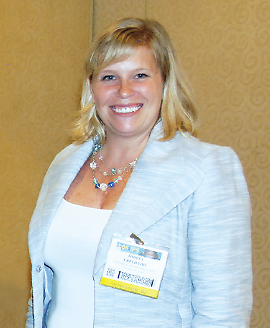One key to making a large mental health system more recovery oriented is using empirically supported, evidence-based treatments, and that was the premise that brought one big city and the godfather of cognitive therapy together.
A few years after Arthur Evans, Ph.D., took over in 2004 as commissioner of Philadelphia’s Department of Behavioral Health and Intellectual disAbility Services (DBHIDS), he had a conversation with Aaron Beck, M.D., the man who developed cognitive-behavioral therapy (CBT) in the 1960s.
“We know that CBT works, but it is not widely practiced in the field, so let’s use Philadelphia as a laboratory to work on implementation issues,” Evans recalled Beck saying in 2006.
The benefits of CBT are by now well known, but it is closely associated with individual outpatient therapy. Evans saw a partnership with Beck as a means to get an evidence-based treatment into a wide range of settings within a public mental health system, especially for the benefit of people with serious mental illness.
Clinicians in England had used CBT to treat psychosis-related distress but not negative or cognitive symptoms, said Paul Grant, Ph.D., a research assistant professor of psychology in psychiatry at the Aaron T. Beck Psychopathology Research Center in the Perelman School of Medicine at the University of Pennsylvania. He spoke at the APA Institute on Psychiatric Services in October on behalf of Beck, who was unable to attend.
Research by Beck and colleagues showed a correlation between negative symptoms and defeatist beliefs, such as an unwillingness to take risks or a fear of rejection, said Grant.
“Our theoretical framework for therapy now sees low functionality not as being about neurological deficits, but about those beliefs,” he said. “Our goal is to turn negative symptoms into problems to be addressed and translating problem behaviors into underlying feelings that can be addressed in therapy.”
Beginning in 2007, instructors from the Beck center undertook a six-step strategy to train personnel from 27 DBHIDS agencies in the use of CBT.
First, the instructors spent time learning about the agency and its operations by talking to supervisors and therapists in order to adapt the CBT program to the setting.
Next, they conducted 22 hours of intensive workshops over several days using materials specifically tailored to the agency’s clientele.
“The goal was not to get the staff ready to use their knowledge, but to give them the tools they’d need,” said Torrey Creed, Ph.D., a research assistant professor of psychology in psychiatry at the Beck Psychopathology Research Center and a faculty member at the Beck Institute. “Workshops alone are not enough.”
The next step came as training cases were selected from the trainees’ existing caseloads. The Beck instructors met with groups of six agency therapists once a week for six months, Creed noted. Together, they reviewed audiotapes of the clinicians using CBT. “The instructors actively made treatment suggestions at first but steadily phased themselves out as clinical colleagues in the agency built skills, gave more support, and combatted program drift,” said Creed.
The instructors also reviewed samples of audiotapes at three and six months after the training began to measure adherence. A total of 245 clinicians at 27 agencies began the first round of training, and 185 completed it. Of those, 133 trainees met competency goals at six months, and the rest received more intensive feedback on how to improve their use of CBT.
“We’re building in an ongoing expectation that people will stay on board,” said Creed, adding that “network and agency support are critical.”
To sustain the program and its quality, the agencies maintain their own internal consultation process, the Beck center provides support as needed, web-based training is available, review meetings are held as “booster” sessions, and clinicians must be recertified every two years.
“The Beck Initiative created a context in which evidence-based practice can be adapted so it can move into the community quickly,” said Creed.
The group has now completed one year of a similar training program in a rural area of southwestern Georgia.
The Beck Initiative shows that patients with serious mental illness can have residual symptoms but can still function and have more productive and fulfilling lives, said Evans.
“The big challenge in the field is not what works but how to get it to work in real-world settings,” he stated. “We found that you need to work at multiple levels simultaneously—including the organizational and system levels—and not just with practitioners.” ■

